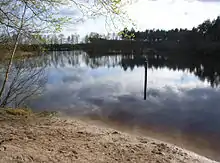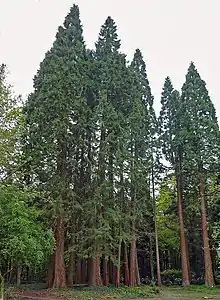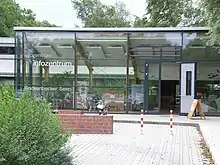Maas-Schwalm-Nette Nature Park
The Maas-Schwalm-Nette Nature Park (German: Naturpark Maas-Schwalm-Nette; Dutch: Grenspark Maas-Swalm-Nette) or NMSM is a cross-border nature park in Germany and the Netherlands, which was founded in 2002. It is a regionally important recreation area.




Description
The park has an area of 870 km². Its name comes from the major rivers that flow through it, the Maas (English: Meuse), Schwalm and Nette.
The park is often confused with the Schwalm-Nette Nature Park which was founded in 1965 and has since been integrated into the NMSN.
It covers an area that includes the counties of Kleve, Viersen and Heinsberg as well as the town of Mönchengladbach in Germany and in the municipalities of Roermond, Roerdalen, Venlo, Echt-Susteren, Leudal and Maasgouw in the Netherlands.
Within the Maas-Schwalm-Nette Nature Park is the nature reserve of Krickenbecker Seen with its four lakes that were formed by peat cutting. On the territory of Niederkrüchten lies the only juniper heath of the Lower Rhine Region, surrounded by the Elmpter Schwalmbruch. In addition the Kaldenkirchen Border Forest (Nettetal) with its arboretum, the Sequoia Farm and the geo-hydrological water garden is part of the park.
21 visitor centres provide information about the landscape, art, nature, culture and history of the park. Numerous excursions and activities are also offered.
Its water balance was and is affected by the brown coal open-cast pits south of Mönchengladbach. After the Garzweiler I pit had been exhausted, work began on Garzweiler II. This is slowly approaching Mönchengladbach and also the NMSN.[1]
Information centres


- in Germany
- Haus Püllen nature park centre in Wachtendonk
- Krickenbecker Seen information centre in Nettetal
- Nature park information point at Brüggen Castle
- Wildenrath Nature Park Centre near Wegberg
- in the Netherlands
- Groote Heide information centre near Venlo
- Visitor centre of the De Meinweg National Park near Herkenbosch
Nature reserve facilities
- NABU nature reserve centre (Naturschutzhof) in Nettetal-Sassenfeld
- NABU nature reserve station at Haus Wildenrath
Museums and other facilities
- in Germany
- Lower Rhine Open-Air Museum in Grefrath
- Die Scheune Textile Museum in Nettetal-Hombergen
- Landschaftshof Baerlo in Nettetal-Leutherheide with "green classroom"
- Geo-hydrological water garden in Nettetal-Kaldenkirchen
- Kaldenkirchen Sequoia Farm – arboretum
- Hunting and natural history museum, Brüggen Castle, Brüggen
- Schrofmühle mill in Wegberg-Rickelrath
- Beecker Flax Museum in Beeck (Wegberg)
- in the Netherlands
- Kinderboerderij Hagehof near Venlo, a farm for children
- Botanische Tuin, Jochum-Hof in Steyl has hiesige plants and a Mediterranean garten
- Visitor centre Towana en keramiekcentrum Tiendschuur in Tegelen offers insights into the hiesige manufacture of pottery
- De Kookboerderij en De Historische Groentehof in Beesel; a cooking studio in an old farmyard
- St. Elisabethshof NME Centre en Strekkmuseum Leudal in Haelen with local history museum
- The Roerstreek Museum in Roermond with inter alia archaeological finds
- Das Bijen visitor centre in Mariahoop provides information on the world of bees
Film
References
- "Braunkohletagebau - Einblicke 28 - Pressestelle - Universität Oldenburg". www.presse.uni-oldenburg.de.